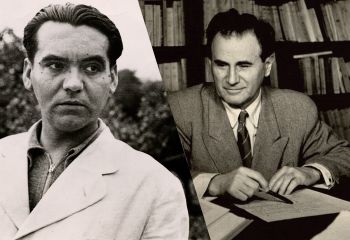
Camil Petrescu: Interviuri [Camil Petrescu: Interviews]
Editors: Florica Ichim – Alexandru Bulcan
‘Camil Petrescu’ Cultural Foundation – Teatrul Azi magazine, 2022
Federico García Lorca: Teatru [Theatre]
Anthology, editor: Ioana Anghel
‘Camil Petrescu’ Cultural Foundation – Teatrul Azi magazine, 2022
Book Launch by the "Camil Petrescu" Cultural Foundation - "Teatrul Azi" Magazine
CAMIL PETRESCU - INTERVIEWS, edited by Florica Ichim and Alexandru Buican.
The book features interviews conducted over more than two decades by great journalists or future writers (Eugen Jebeleanu, Felix Aderca, etc.) or by young newcomers whom Camil Petrescu supported, the book covering several decades of our culture, involving events, conflicts, achievements and spectacular failures. Some interviews succeed in leading Camil Petrescu to make a meaningful confession, others only irritate him, however altogether they constitute valuable documentary material and a captivating spectacle of the era in which Camil Petrescu lived. The annotations are signed by Florica Ichim and Alexandru Buican.
Federico García Lorca - THEATRE
Anthology by Ioana Anghel
The collection contains four dramatic texts: Blood Wedding (1933), Yerma (1934) and The House of Bernarda Alba (1936), all three forming the Rural Trilogy, and The Public (1930).
A bride abandons her wedding, a young woman fails to get pregnant, a widow imposes a rigorous mourning period on her five daughters. In the moonlight, the women of these rural dramas search for a way through the barren land of marriage, motherhood and widowhood, only to find violence, loneliness, silence and death. The Rural Trilogy is one of the most important works in Spanish literature.
Written around 1930 but not premiered until 56 years later, the play The Public is considered one of the most important plays of the 20th century. The Public speaks of theatre and speaks of desire, through a play of masks in which fiction and reality overlap, in which identities are in constant metamorphosis, in a perpetual quest for authenticity, honesty and freedom.
Federico García Lorca's work and existence became, from the time of his life, but especially after his death, both a symbol and a myth. The fact that his body - buried after his execution in a mass grave - was never found has an extremely powerful symbolic value in Spain. Also, extrapolating to all corners of Europe where wars and revolutions of the 20th century have left behind murders and mass graves. More than 85 years after his execution, the fronts on which Federico García Lorca fought in his short life remain open.